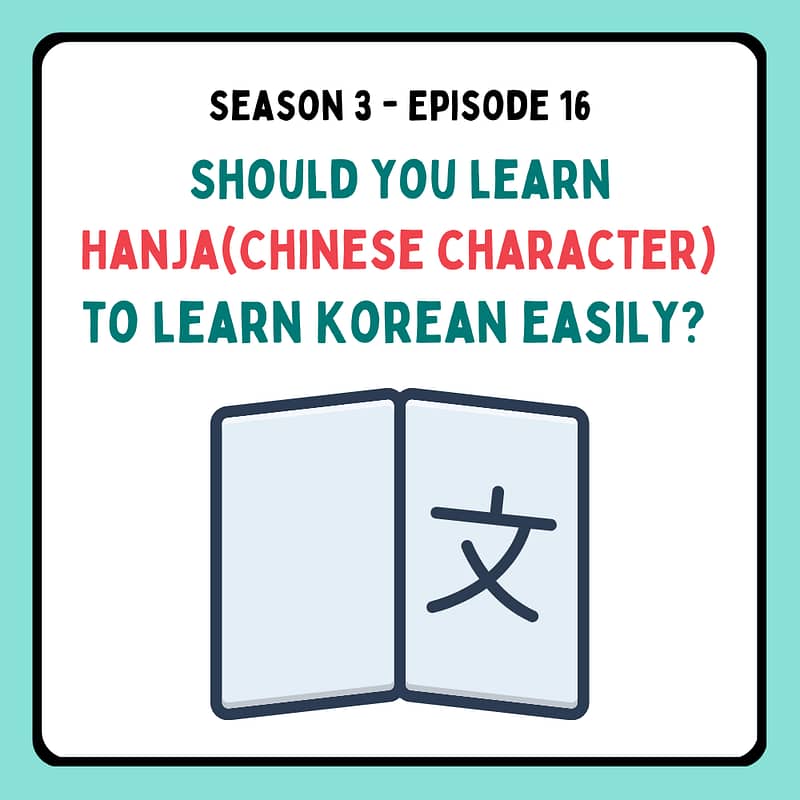Powered by RedCircle
S3 EP16 한국어를 쉽게 배우기 위해서 한자를 배워야 할까?
S3 EP16 Should you learn Hanja(Chinese character) to learn Korean easily?
안녕하세요? 잘 지냈어요? I’m your host, Vanessa, here at Korean Study Cafe Podcast.
Today I am going to answer a question I received from one of the Korean learners, ID somangdominika8654.
Let’s listen to her message together.
Hi! I live in Poland and am a university student majoring in Korean language and literature. I heard from my senior friends that learning Hanja is necessary for understanding the Korean language in depth. I guess that’s why our university has Hanja subject on its curriculum.
But I also heard from some Korean friends who are native speakers that learning Hanja is a waste of time, and young Korean people also don’t know many Hanja either, and their point is it’s not important to be fluent in Korean.
My ultimate goal is, of course, to become fluent in Korean when having a conversation with Korean people. But I also want to graduate the school with good grades. But I am actually struggling with memorizing vocabulary and speaking Korean without hesitation.
So in order to achieve my goals and overcome the difficulties, learning Hanja would be helpful for me? Or would it be just a waste of time?
Please share your advice.
Have you guys also wondered about this, too?
I know remembering Korean words is hard. There are many words looking similar, yet the meanings are different, or sometimes one word has many different meanings simultaneously, right?
So it’s confusing for sure.
Especially if your mother tongue is not rooted in Asian languages, sometimes you might feel hopeless, and learning Korean words may seem too overwhelming or impossible to do. This is very natural because you’re learning a language that doesn’t resemble your mother tongue.
So I guess that is why many Korean learners are asking me if learning Hanja would be helpful to ease this.
I will give you an answer to this question.
My answer is Yes and No, depending on your needs. You’re now probably listening to this and wondering what I meant.
Let’s think differently for a moment. To learn English, Spanish, or French, do people need to learn Latin, Ancient Greek, or Roman language? You probably wouldn’t. Of course, it will help you understand the language you’re trying to learn better and deeper, but it’s hard to say that it’s absolutely necessary or mandatory. Also, the native speakers of each language either wouldn’t fully understand the root of each word, and it is probably not practical to know each word that deeply. Likewise in Korean, just trying to know the word roots that are used often in daily conversation is enough to improve your Korean language.
If you need to learn Korean academically and linguistically, you should definitely learn Hanja. So for the student who sent me a message majoring in Korean language and literature, I want to say, “Yes, learning Hanja is important for you to get a good grade.” However, if you are learning Korean just to be fluent in conversations with native speakers, you don’t really have to learn it in-depth. In that case, it’d be just a waste of time and energy.
Of course, if you learn Hanja, it’d be beneficial to improve your Korean learning and memorize Korean vocabulary a bit easier. Also, you would be able to guess what a word means vaguely, even though the word is that you just saw for the first time. Yup, knowing many of Hanjas’ meanings will make you feel easy when it comes to dealing with new vocabulary.
Despite all these benefits, you don’t have to try memorizing what each Hanja, a Chinese character, looks like unless you are willing to learn Chinese in the future or you have to learn it because of your school curriculum. You only should know the Korean letter and the Korean pronunciation of Hanja.
For example, there’s a Korean word that came from Hanja. That’s 일. This one word has several meanings, such as “One,” “Work,” “Day,” and “Comfort.” It looks like the word 일 has so many meanings in Korean. In Hanja, the Chinese character, even though the pronunciation for each word is the same, the intonation and the character, as known as how the character looks for each one, are different.
So if you are just thinking about learning only Korean, you don’t need to know “how the hanja character is shaped” because Koreans don’t use Hanja daily basis. So this is why I am saying that knowing Hanja is not really related to having good conversational skills.
If you visited or lived in Korea for a month, you will agree with my answer. Not only will you not have opportunities to use it, but you will also notice that young Koreans below the 30-40s don’t know many Hanja. People can still make conversations and communication without any problems.
The importance of Hanja has been reduced so much, and the public education curriculum for Korean citizens has become more practical. Of course, they try to make Korean people understand and master the Korean language better, but they no longer focus on things that are not useful or practical to use in real life. That’s why Hanja is an optional course, not a mandatory class in Korean public schools, even for Koreans.
All in all, depending on your needs, the importance of Hanja would be different. So I want you to make an optimal strategy for learning Korean for you while referring to my opinions as a Korean teacher. Also, if you still can’t find the perfect answer for you, you can contact me via Instagram. I would be happy to consult with you about this concern.




